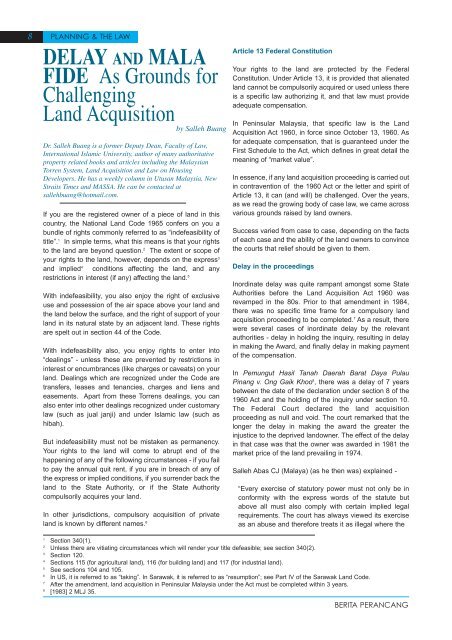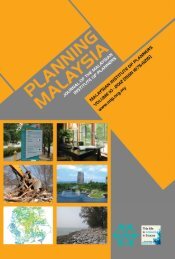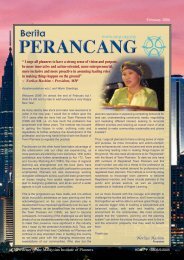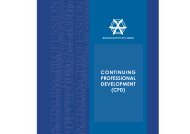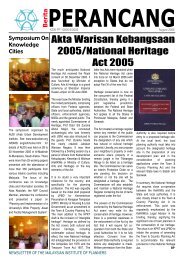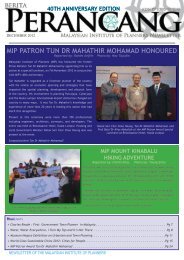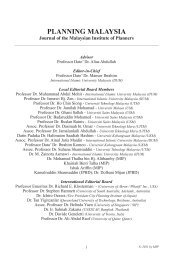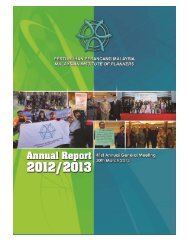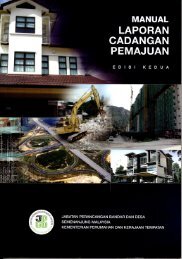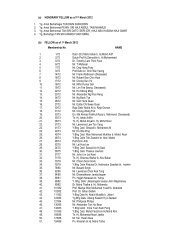Download November 2005 Issue - Malaysian Institute of Planners
Download November 2005 Issue - Malaysian Institute of Planners
Download November 2005 Issue - Malaysian Institute of Planners
Create successful ePaper yourself
Turn your PDF publications into a flip-book with our unique Google optimized e-Paper software.
8PLANNING & THE LAWDELAY AND MALAFIDE As Grounds forChallengingLand Acquisitionby Salleh BuangDr. Salleh Buang is a former Deputy Dean, Faculty <strong>of</strong> Law,International Islamic University, author <strong>of</strong> many authoritativeproperty related books and articles including the <strong>Malaysian</strong>Torren System, Land Acquisition and Law on HousingDevelopers. He has a weekly column in Utusan Malaysia, NewStraits Times and MASSA. He can be contacted atsallehbuang@hotmail.com.If you are the registered owner <strong>of</strong> a piece <strong>of</strong> land in thiscountry, the National Land Code 1965 confers on you abundle <strong>of</strong> rights commonly referred to as “indefeasibility <strong>of</strong>title”. 1 In simple terms, what this means is that your rightsto the land are beyond question. 2 The extent or scope <strong>of</strong>your rights to the land, however, depends on the express 3and implied 4 conditions affecting the land, and anyrestrictions in interest (if any) affecting the land. 5With indefeasibility, you also enjoy the right <strong>of</strong> exclusiveuse and possession <strong>of</strong> the air space above your land andthe land below the surface, and the right <strong>of</strong> support <strong>of</strong> yourland in its natural state by an adjacent land. These rightsare spelt out in section 44 <strong>of</strong> the Code.With indefeasibility also, you enjoy rights to enter into“dealings” - unless these are prevented by restrictions ininterest or encumbrances (like charges or caveats) on yourland. Dealings which are recognized under the Code aretransfers, leases and tenancies, charges and liens andeasements. Apart from these Torrens dealings, you canalso enter into other dealings recognized under customarylaw (such as jual janji) and under Islamic law (such ashibah).But indefeasibility must not be mistaken as permanency.Your rights to the land will come to abrupt end <strong>of</strong> thehappening <strong>of</strong> any <strong>of</strong> the following circumstances - if you failto pay the annual quit rent, if you are in breach <strong>of</strong> any <strong>of</strong>the express or implied conditions, if you surrender back theland to the State Authority, or if the State Authoritycompulsorily acquires your land.In other jurisdictions, compulsory acquisition <strong>of</strong> privateland is known by different names. 6Article 13 Federal ConstitutionYour rights to the land are protected by the FederalConstitution. Under Article 13, it is provided that alienatedland cannot be compulsorily acquired or used unless thereis a specific law authorizing it, and that law must provideadequate compensation.In Peninsular Malaysia, that specific law is the LandAcquisition Act 1960, in force since October 13, 1960. Asfor adequate compensation, that is guaranteed under theFirst Schedule to the Act, which defines in great detail themeaning <strong>of</strong> “market value”.In essence, if any land acquisition proceeding is carried outin contravention <strong>of</strong> the 1960 Act or the letter and spirit <strong>of</strong>Article 13, it can (and will) be challenged. Over the years,as we read the growing body <strong>of</strong> case law, we came acrossvarious grounds raised by land owners.Success varied from case to case, depending on the facts<strong>of</strong> each case and the ability <strong>of</strong> the land owners to convincethe courts that relief should be given to them.Delay in the proceedingsInordinate delay was quite rampant amongst some StateAuthorities before the Land Acquisition Act 1960 wasrevamped in the 80s. Prior to that amendment in 1984,there was no specific time frame for a compulsory landacquisition proceeding to be completed. 7 As a result, therewere several cases <strong>of</strong> inordinate delay by the relevantauthorities - delay in holding the inquiry, resulting in delayin making the Award, and finally delay in making payment<strong>of</strong> the compensation.In Pemungut Hasil Tanah Daerah Barat Daya PulauPinang v. Ong Gaik Khoo 8 , there was a delay <strong>of</strong> 7 yearsbetween the date <strong>of</strong> the declaration under section 8 <strong>of</strong> the1960 Act and the holding <strong>of</strong> the inquiry under section 10.The Federal Court declared the land acquisitionproceeding as null and void. The court remarked that thelonger the delay in making the award the greater theinjustice to the deprived landowner. The effect <strong>of</strong> the delayin that case was that the owner was awarded in 1981 themarket price <strong>of</strong> the land prevailing in 1974.Salleh Abas CJ (Malaya) (as he then was) explained -“Every exercise <strong>of</strong> statutory power must not only be inconformity with the express words <strong>of</strong> the statute butabove all must also comply with certain implied legalrequirements. The court has always viewed its exerciseas an abuse and therefore treats it as illegal where the1Section 340(1).2Unless there are vitiating circumstances which will render your title defeasible; see section 340(2).3Section 120.4Sections 115 (for agricultural land), 116 (for building land) and 117 (for industrial land).5See sections 104 and 105.6In US, it is referred to as “taking”. In Sarawak, it is referred to as “resumption”; see Part IV <strong>of</strong> the Sarawak Land Code.7After the amendment, land acquisition in Peninsular Malaysia under the Act must be completed within 3 years.8[1983] 2 MLJ 35.BERITA PERANCANG


